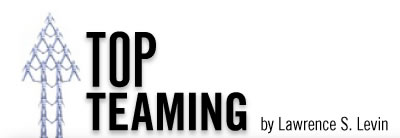Coaching in Context: Evolving Leaders and Top Teams
Over the past twenty years, the Levin Group has coached a lot of people across a wide range of industries. When we began, we tended to work with existing or promising executives, or those who were in trouble. One of the things we quickly learned is that unless you understand the unique business the executives are in, with the specific demands, intellectual requirements, structure, strategic direction, organizational and cultural history, key players, and more, your effectiveness as an influencer of behavior and as an advisor is limited.
Our clients were always the first ones to know that. So our strong belief, shaped by many years of doing this, is that good coaching always occurs in the context of a specific business, and in that unique milieu; that is the team where the leader sits. You have to know the territory.
We typically define good Executive Coaching as a strong relationship between a mission-critical leader and an experienced business consultant that is designed to accelerate the leader’s and his or her team’s effectiveness in achieving strategic, business, and interpersonal outcomes. Note that we define coaching to include “raising the bar of the team.”
And the understanding of context goes further. Understanding what a leader needs Now or Next requires that the coach be able to ask and understand the relevant strategic questions about the future vision for the organization and what it will require to create the requisite alignment. If the executive is being asked to be a growth leader, it may require that the coach understand the dynamics and demands of organic versus acquisitional growth. If the leader is addressing transitional challenges, such as how to operate successfully in a new role, it requires understanding both the demands and context of the new role as well as understanding the capabilities, strengths, and weaknesses that the leader brings from her or his old one.
Challenges of the Now, New, and Next include:
- Understanding and accelerating the current demands on, performance and behaviors of the leader;
- Understanding the evolving nature of the business and what the evolving leader needs to develop in order to best anticipate and drive change (“Skating to the puck”);
- Ensuring that leaders are focused on their few critical priorities which may include increased awareness of self and context, improved and more influential interpersonal behavior, and key areas of improved performance and results.
Coaching should always serve to increase interpersonal awareness and Emotional Intelligence for leaders who don’t realize their full impact upon others. Yet it can and should do even more, including address issues of decision-making, risk-taking, building organizational courage and, ultimately, greater success.
Experience Matters – Knowing the Territory Matters – Results Matter
